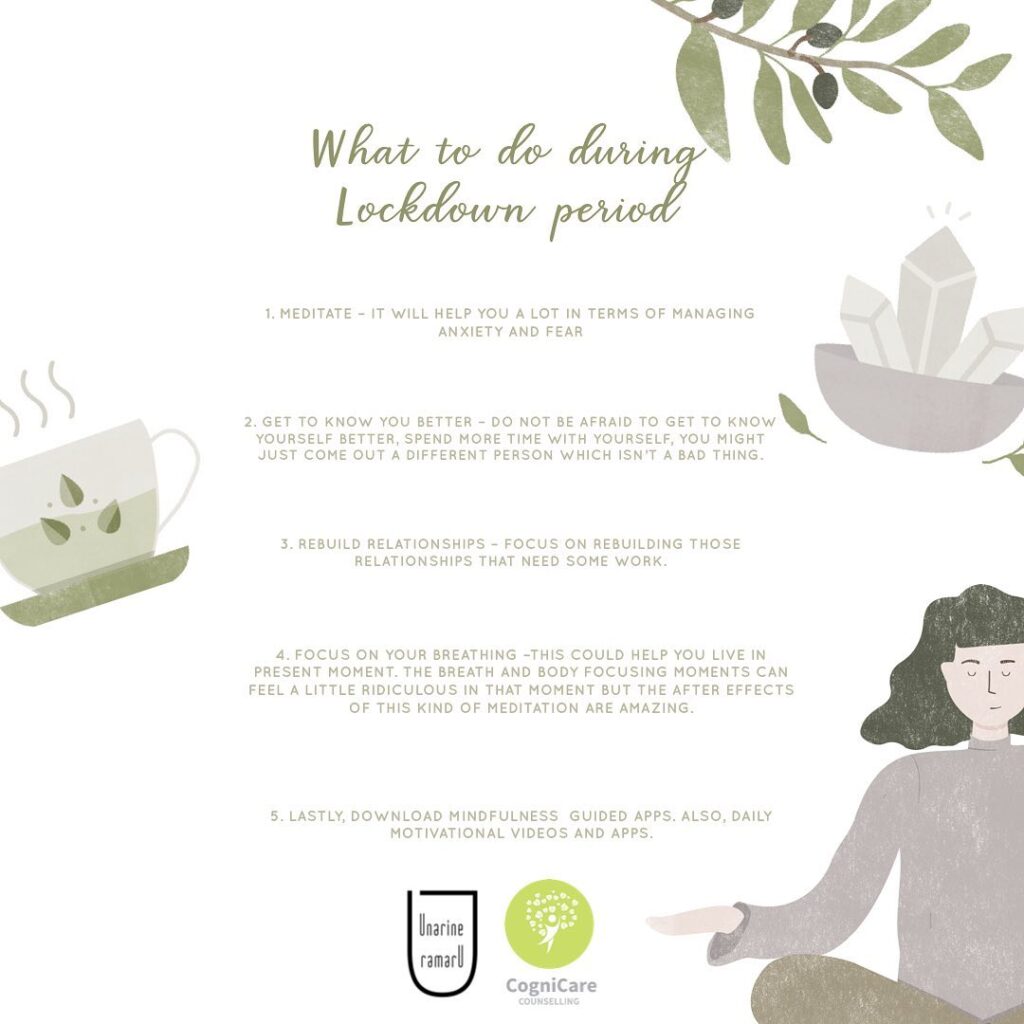
As a registered counsellor, I have come to the realisation that this lockdown season is and will continue to be upsetting for many of us. Let us look at the Novel Coronavirus (Covid-19, Wuhan-virus) pandemic from a mental health perspective. The Coronavirus has become a global problem causing the whole world to be at war with a faceless enemy we have no weapon against. Thus far, Corona-virus has claimed thousands of lives across the world. In addition to this, the virus continues to grip many more by the throat as the numbers of infected persons continues to escalate. This has stirred up fear and anxiety as more and more people are beginning to wonder if they are next.
The question of who will be infected next is rhetorical as it cannot be answered as the disease does not discriminate between social classes and ages. However, the sickly and elderly from the ages of 60 going upwards are the most vulnerable due to their being immunocompromised. I am really hoping that this read can be as informative as possible!
What to expect
As stated in the beginning, I want us to observe the entirety of this situation looking from a psychological perspective. This lockdown season that our country is going through will have many, if not all of us, being subjected to a lot of emotional and mental stress due to the conditions we are currently subjected to that we normally are not. We no longer have the freedom to move around and more than ever, the importance of that right has never been more pronounced. With that said, I wanted to outline some of the phases that I believe you are most likely to go through or that I know you should go through during lockdown. They might sound a lot like the stages of grief but they’re not although they are quite related because you are grieving your daily life in a sense.
One of the main early experiences that you’re most likely to experience is optimism. Initially, you may say to yourself, “at least I can finally get some free time and I can do everything I’ve ever wanted to do.” Here are more examples are some of thoughts that might go through your mind: “I feel like I’m going to work on that hobby that I’ve always wanted to do, I’m going to catch up on all the work that I’ve been behind with”. You are going to have all these ideas and thoughts, but in all honesty, they can all just easily be followed by a sense of depression.
Determination is when you start to realise that “oh my goodness I can’t do this, it’s not fun anymore, it’s a little bit too much for me”… your positivity as is low. You start quizzing why you even need to be confined, when, in essence you know why you need to have your movements restrained but you’re not as excited about it as you were in the start. You just tell yourself during the face of depression that, “let me just keep going”, “let me just keep pushing”, “I can do this let me set a schedule for myself”, “let me see how I can manage the situation”, “let me let me stick to my routine and make this work”, etc., and that is determination.
Satisfaction and frustration constitute another phase. Please note that these periods happen in no particular order. One can start feeling depressed and then later become optimistic. So, when you come to the phase of satisfaction and frustration, you will experience times when you are highly productive and times when production is little. A lot of productivity means satisfaction and below average amounts of productivity mean frustration. An individual may find themselves alternating between these two moments of frustration and satisfaction. What to do in such a time? I like practical solutions so say for instance: I am currently working from home but the workload seems to switch from being doable and being impossible, I’m constantly alternating between negative and positive emotions. However, at the back of my mind I’m still very positive. I’m going to get everything done and it just doesn’t have to happen all on the same day! On different days I’m going to get all that work done eventually.
The confusion and constant interchanging of emotions, can ultimately lead to depression. A lot of people have a misconception of what depression is and thus use the word loosely. With depression, you are ceaselessly battling with perpetual emotional changes, struggle with keeping up with everything, endlessly feel overwhelmed, feel low and intensely feel boredom. When depressed, you feel as if your routine or schedule just doesn’t work anymore. You might even start to experience restlessness, so much of it that it becomes difficult to concentrate and you start to miss going out, you miss hanging out with your friends, you miss seeing your family members and all of that that can be a little bit draining leading to you feeling demotivated, hopeless and even despaired.
One of the most important phases that I like to talk about, is anger. Anger is most likely to occur after depression even though these periods no particular order. This is a good phase to go through because in reality, we don’t only get upset with people but we also get upset with situations as with grief. When you start to explore your emotions of anger you start to really get in touch with the situation and your emotions. You even start to become irritated with those around you. For me honestly, I feel that once you have gone through anger, it has to be followed by acceptance and then making or finding meaning from a situation. These three make up the last of stages and as much as I said that there is no particular order in which an individual goes through these, I believe they should follow a sequence because they complement one another. So after anger, you’d go through the phase called ‘acceptance’ this is when you start to accept the situation as it is because you have already argued with yourself regarding the situation.
Now you’re at a phase of acceptance because you have negotiated and you’ve come to an understanding and you’re like: “ok let me accept it as it is, let me work with it, let me set a schedule, let me see how I can make things work better, let me see how I can relate better with people”. This is then followed by a phase called ‘making meaning’. This when you tell yourself: “okay this is something that’s going to pass, it’s not forever, and I’m serving humanity”.
What to do
First and foremost, be aware of the fact that if you experience all these emotions, it is okay and it is normal. On the bright side, pollution is decreasing… air pollution, land pollution, all sorts of pollution. Mother earth is recharging. Additionally if we can all seriously observe the government’s advice, there will be lesser cases. Use this time to get to know “you” better.
Some thoughts:

